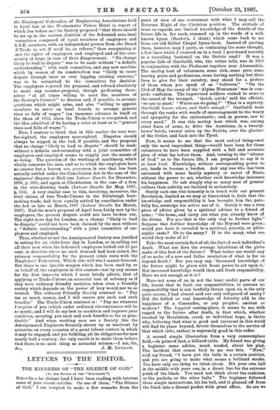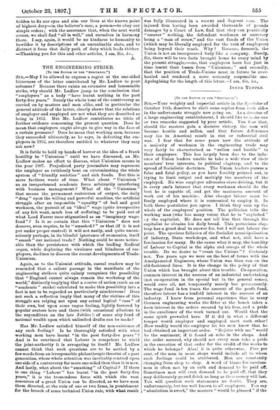LETTERS TO THE EDITOR.
THE KINDNESS OF "THE SILENCE OF GOD."
[To THI EDITOR OF TRH "SPECTATOR."]
Sin,—In a far distant land I have been reading with interest some of your recent articles. On one of them, "The Silence of God," I am tempted to make a few remarks from the
point of view of one conversant with what I may call the Extreme Right of the Christian position. The attitude of trust as regards our limited knowledge of the details of the future life is, for such, summed up in the words of a well- known hymn (Baxter's, I think) which come back to me from our old Balliol Chapel hymn-book. Instead of quoting them, however, may I quote, as containing the same thought, a few lines which I chanced on in a book I purchased recently at a travelling bookstall on the Stelvio road ? It was a popular Life of Garibaldi, who, the writer tells, was in 1859 in conjunction with the Piedmont regulars near Alessandria. The motley host of volunteers, some rich, some poor, some leaving posts and professions, some having nothing but their lives to give for their country, may stand for a picture of those whom you speak of as "believers." "On the 23rd of May the camp of the Alpine Huntsmen' was in com- plete confusion. The improvised soldiers rushed to arms to the sound of the trumpet. Quick, quick,' said the officials, we are to start." Where are we going?' ' That is a mystery. Garibaldi knows where, and that's enough!' Garibaldi went through the ranks with words of encouragement to the weary and sympathy for the enthusiastic ; and, in person, saw tc, every need." It was this motley host which was, among other feats of arms, to drive the Austrians, in a twenty- hours' battle, twenty miles up the Stelvio, over the glaciers of the Ortler, and back into the Tyrol.
Now, it seems to me that the most unkind thing—not only the most imprudent thing—would have been for these volunteers to have been supplied with a full and accurate- plan of what lay before them. And, turning to the "silence of God" as to the future life, I am prepared to say it is at least kind. Knowledge, without corresponding power to- act, tends to become a burden. Ask any one who has been entrusted with some family mystery or secret of State, without the power to act, whether such knowledge increases his happiness. Or ask simply why so many men of greater culture than activity are inclined to melancholy.
Surely each one who honestly is in touch with our present Revelation, limited as we may at times think it, feels that the knowledge and responsibility it has brought him far, pain- fully far, outstrips his active use of it. Surely it was a wise- piece of advice given by a spiritual adviser to a friend of mine : "Go home, and carry out what you already know of the divine. For you that is the only way to further light." Suppose that further knowledge of the Beyond were given ; would you have it revealed to a spiritual, priestly, or philo- sophic caste ? Or to the many If to the many, what use would they make of it ?
Take the most certain fact of all, the fact of each individual's death. What use does the average inhabitant of the globe make of this fact of the future ? What better use would any of us make of a new and fuller revelation of what is for us beyond death ? But you may say, 'Increased knowledge of the future might be given with fresh power to act upon it.' But increased knowledge would then add fresh responsibility. Have we not enough as it is ?
Have not some of us, in not the least useful parts of our life, learnt that to limit our responsibilities, to assume no responsibility that is not lawfully thrust upon us, is the only quiet course, I had almost said our only safeguard of sanity ? Did the fabled or real knowledge of futurity add to the happiness of a Cassandra, or any prophet, ancient or modern? The happiest resting-place, it seems to me, with regard to the future after death, is that which, whether reached by Revelation, creed, or individual hope, is theirs who, believing that what is good and universal in this world will find its place beyond, devote themselves to the service of that which (who, rather) is supremely good in this order.
A second simple illustration from a very commonplace field,—in point of fact, a billiard-table. My friend was giving a beginner some advice, much needed, about his play. The incident that comes back to me was this. "Now,' said my friend, "I have put the balls in a certain position, and you are going to make what seems a brilliant stroke. You have only one thing to think about. Hit your own ball in the middle with your cue, in a direct line for the extreme point of the black. You need not think about the cushions,. or the pockets, or the other balls." The beginner followed these simple instructions, hit his ball, and it glanced off from the black into a distant pocket with great effect. So are we bidden to fix our eyes and aim our lives at the known point of highest duty—in the believer's case, a person—to obey our simple orders ; with the assurance that, when the next world comes, we shall find "all is well," and ourselves in harmony there. I say, again, it would be no kindness to humanity to bewilder it by descriptions of an unrealisable state, and to distract it from that daily path of duty which leads thither. —Thanking you for this and other articles; I am, Sir, &c.,
A.











































 Previous page
Previous page